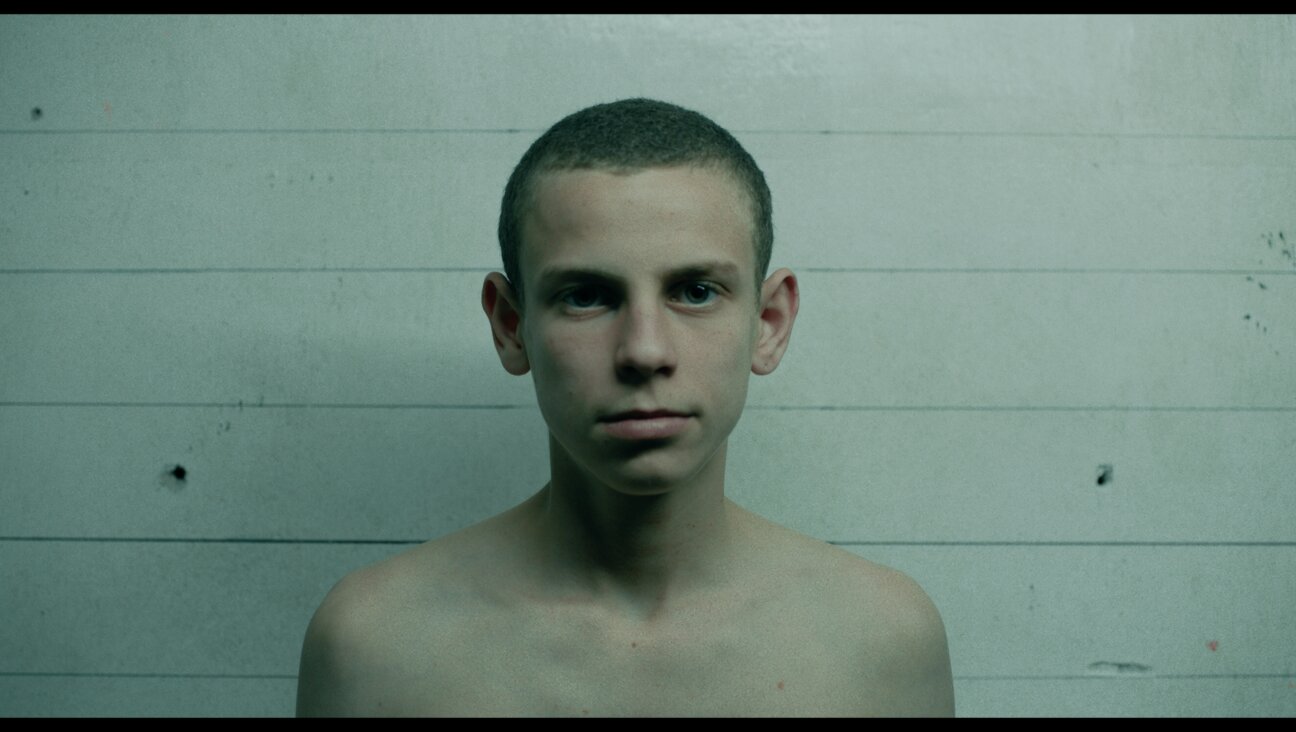WATCH: Project X, Or Eternal Sunshine of the Palestinian Mind

Samer Bisharat, star of Oscar-nominated “Omar,” in Project X / YouTube
If you’ve ever seen the movie “Eternal Sunshine of the Spotless Mind,” you’ll immediately be reminded of it after watching the newly released short film “Project X.” The basic plot is the same. Except instead of Jim Carrey trying to erase Kate Winslet from his memory, you get an 18-year-old Palestinian who’s having the memory of his girlfriend forcefully taken from him — by a team of Israeli doctors.
Why are the docs trying to rid the Palestinian protagonist of this girl? Because the memory of her keeps him from doing what they so desperately want him to do: enlist in the Israeli army.
The teen is approached earlier on by an Israeli army recruiter (trying really, really hard to sound like a native Arabic speaker — and failing), who tries to sell him on military service by promising it’ll “open a million doors.” In return for his service, he’ll get “a backbone that no one will mess with.” Also: “Land — land that you’ll own.” Imagine!
Still, the Palestinian resists. And because he resists, he ends up on an operating table, where Israeli doctors who specialize in “brain programming” are tasked with making him more amenable to the state’s demands. They succeed: Stripped of the memory of his girlfriend, who was always telling him that “this is not the way for us,” he ends up a soldier in uniform — with his own people’s blood on his hands.
This six-minute movie, directed by Nadim Hamed and produced by the Arab Center for Social Media Advancement in cooperation with Baladna, warrants a lot more than six minutes (or 600 words) of analysis. It’s interesting on a lot of levels. For one, it’s intriguing that a young woman plays the voice of reason. There’s the idea that love has the ability to safeguard people from betraying their authentic identity, their highest self, their truest beliefs. And there’s the striking confidence with which the Israeli recruiter dangles the promise of land in front of the protagonist — as if to say that Palestinians these days are so deprived of secure ownership over their land that nobody in their right mind could turn that offer down.
And then there’s the central takeaway of this didactic yet powerful film: the idea that young Palestinian citizens of Israel should utter a resounding “no” when encouraged to join the army.
That idea’s not coming out of nowhere. Although Palestinians aren’t required to serve in the army (excepting minority groups like the Druze), Israel has been stepping up its efforts to recruit the Christians among them, sending call-up notices to volunteer for service. In fact, the Project X film is part of a larger campaign, titled “I am an Arab; I will not serve,” that aims to discourage Palestinian youth from heeding these conscription notices.
Israel’s recruitment efforts are meeting with increasing resistance — not just among young Palestinians and Druze, but also, these days, among young Jews. As a growing number of Jewish conscientious objectors make their voices heard, you’ve got to wonder: Will they also take to film and other artistic media to discourage their friends from obeying Israel’s army summons? Is a Jewish version of Project X — Eternal Sunshine of the Sabra Mind — next on the horizon?
The Forward is free to read, but it isn’t free to produce

I hope you appreciated this article. Before you go, I’d like to ask you to please support the Forward.
Now more than ever, American Jews need independent news they can trust, with reporting driven by truth, not ideology. We serve you, not any ideological agenda.
At a time when other newsrooms are closing or cutting back, the Forward has removed its paywall and invested additional resources to report on the ground from Israel and around the U.S. on the impact of the war, rising antisemitism and polarized discourse.
This is a great time to support independent Jewish journalism you rely on. Make a gift today!
— Rachel Fishman Feddersen, Publisher and CEO
Support our mission to tell the Jewish story fully and fairly.
Most Popular
- 1

Fast Forward Ye debuts ‘Heil Hitler’ music video that includes a sample of a Hitler speech
- 2

Opinion It looks like Israel totally underestimated Trump
- 3

Culture Is Pope Leo Jewish? Ask his distant cousins — like me
- 4

Fast Forward Student suspended for ‘F— the Jews’ video defends himself on antisemitic podcast
In Case You Missed It
-

News In Edan Alexander’s hometown in New Jersey, months of fear and anguish give way to joy and relief
-

Fast Forward What’s next for suspended student who posted ‘F— the Jews’ video? An alt-right media tour
-

Opinion Despite Netanyahu, Edan Alexander is finally free
-

Opinion A judge just released another pro-Palestinian activist. Here’s why that’s good for the Jews
-
Shop the Forward Store
100% of profits support our journalism
Republish This Story
Please read before republishing
We’re happy to make this story available to republish for free, unless it originated with JTA, Haaretz or another publication (as indicated on the article) and as long as you follow our guidelines.
You must comply with the following:
- Credit the Forward
- Retain our pixel
- Preserve our canonical link in Google search
- Add a noindex tag in Google search
See our full guidelines for more information, and this guide for detail about canonical URLs.
To republish, copy the HTML by clicking on the yellow button to the right; it includes our tracking pixel, all paragraph styles and hyperlinks, the author byline and credit to the Forward. It does not include images; to avoid copyright violations, you must add them manually, following our guidelines. Please email us at [email protected], subject line “republish,” with any questions or to let us know what stories you’re picking up.
















